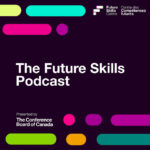Future Skills
Future skills – basic literacy, numeracy and socio-emotional skills – are important across all economic sectors and occupations. Figuring out who and how to address skills gaps is key to building an inclusive workforce with upward mobility.
Event
Learning from one another: A comparative analysis of labour market needs and corresponding skills in Northern Ontario, Yukon, and Nunavut
Join us for an exclusive look at research led by the Conference Board of Canada on behalf of the Future Skills Centre, which looks at labour market demand and skills training in Northern Ontario, Yukon, and Nunavut. Gain insights into the demand for employment in each region as we explain the findings of our economic forecasts for each region. We will also present findings on workforce and skills development challenges and solutions that came from in-depth interviews with over 150 employers and skills training organizations across the three regions. This will be followed by a showcase of innovative skills training programs from each region that address important challenges to training in the north.
Event
Social and emotional skills in the workplace
Social and emotional skills (SES)—also called soft, human, or people skills—are increasingly important for today’s job market. What SES do employers value? How do they assess these skills? What hurdles do they face in recruiting socially and emotionally skilled talent?
Research
The heart of the matter: Understanding hiring demand for social and emotional skills
This briefing looks at the hiring demand for social and emotional skills across the country for different industries and occupation levels.
Research
Social and emotional skills in the workplace: Insights from Canadian employers
This briefing presents findings on recruiting for social and emotional skills based on interviews with human resources professionals as well as analysis of Canadian knowledge-based job postings data.
Research
Employers’ insights on social and emotional skills
This executive summary introduces insights into recruiting for social and emotional skills based on interviews with human resources professionals as well as analysis of Canadian knowledge-based job postings data.
Podcast
Season 4 | Episode 2
Educating for Sustainability—Green Skills in Canada
The urgency of the climate crisis is undeniable. The transition to a clean economy demands significant changes in skills, occupations, and attitudes. In this episode,...
Featuring: Heather McIntosh, Kevin Nilsen, Charles Hopkins, Tanzeela Faisal
In the Media
CASTL launches national biomanufacturing skills and training study in partnership with Future Skills Centre
CASTL has launched a national biomanufacturing skills and training study to gather critical labour market information and future training priorities specific to Canadian biomanufacturing.
In the Media
BCIT receives $230k from Future Skills Centre to enhance Virtualized Experiential Learning Platform
The British Columbia Institute of Technology (BCIT) is pleased to announce that researcher Dr. Moein Manbachi of the Smart Microgrid Applied Research Team (SMART) has been awarded $230,000 in funding from Future Skills Centre. This funding will support the expansion of the Virtualized Experiential Learning Platform (VELP), developed to meet the growing demand for skilled professionals in the green energy sector.
Project
From Data to Decision: AI Training and Professional Certification
This project was a short, online certified program in artificial intelligence (AI) for professionals and leaders offered by IVADO in collaboration with the University of Montreal.










